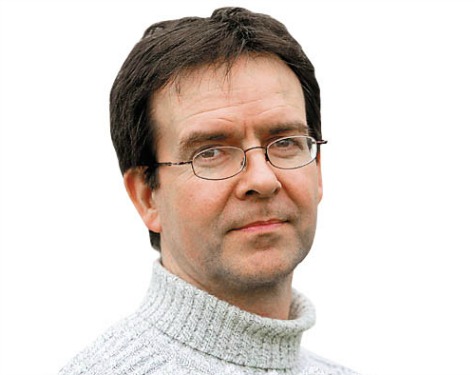 This was a stripped down Opening Ceremony, revealing the truth of so many elements of Britain's history that we take as read in a vivid and beautifully modulated show which presaged a coup de theatre which confounded all the – heated - discussion about Who Would Light The Olympic Cauldron.
This was a stripped down Opening Ceremony, revealing the truth of so many elements of Britain's history that we take as read in a vivid and beautifully modulated show which presaged a coup de theatre which confounded all the – heated - discussion about Who Would Light The Olympic Cauldron.
Not David Beckham. Nor Daley Thompson, nor Kelly Holmes, nor even five-times Olympic champion Sir Steve Redgrave, although all played their part in bearing the Torch on the final stages of long journey to this stadium in east London.
Finally, the ancient Flame was transferred to its temporary resting place by collective youth – seven young athletes nominated by seven of Britain's greatest Olympians and acting jointly to ignite a "Flame of Unity" composed of copper "petals" within a giant bowl in the centre of the stadium which formed itself into a group of firebrands.
Not so much an Olympic cauldron as an Olympic thicket.
And when you think about it, this was entirely in keeping with an Olympics which was drawn towards London rather than Paris by the emphasis the British bidders laid upon what these Games could do for the nation's youth.
Beckham glided on a speedboat up the Thames, along the River Lee, bearing the Flame; Redgrave brought it from the river into the stadium along a lit bridge, playing yet another significant sporting role for his country, but this time not on water but land.
Meanwhile Sarah Stevenson, the 2008 taekwondo Olympic bronze medallist whose parents both died last year and who has overcome injury to secure her place at these Games, took the Athletes' Oath. It was a profoundly touching honour for a determined and courageous competitor – on what was a profoundly touching night.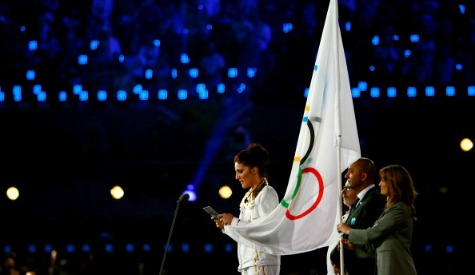 Gone were the huge battalions of Beijing. The stadium was not always filled with noise – images and captions of the screens did much of the necessary work.
Gone were the huge battalions of Beijing. The stadium was not always filled with noise – images and captions of the screens did much of the necessary work.
The central field was not always filled with performers.
The whole show ebbed and flowed, offering successive images and sounds to remind us of and reconnect us with the deepest parts of our national life.
Abide With Me, the setpiece anthem of so many FA Cup finals, was sung with quiet fervour by Akram Khan and Emeli Sande as a small but perfectly formed dance troupe performed in dramatic orange lighting under the disc of an imaginary sun: the old made fresh and new.
The Torch Ceremony was preceded by fireworks and the Arctic Monkeys, playing among other songs the Beatles' Come Together – energy in vivid abundance.
As the teams marched in – to the constant beating of drums – any trepidation about the appearance of North Korea after the Old Trafford flag fiasco was quickly quelled.
It was the correct flag.
Strangely the South Koreans also managed to flourish the correct flag too.
It's not hard, is it?
The succession of excited athletes marching behind their nominated flagbearer and a demurely smiling young maid bearing the name of the nation in a silvery sign above her head recalled directly the Opening Ceremonies of times past. The numerous athletes recording the appearance on mobile phone cameras reminded of times present.
But it is one of enduring richnesses of the Olympics that so many nations are involved, nations that do not tend to find a profile within world sport except for this four-yearly procession: Aruba, Benin, Bhutan, British Virgin Islands, Kiribati, Kyrgyzslan, Federated States of Micronesia, Lao People's Democratic Republic, Nauru, Sao Tome and Principe, Timor Leste...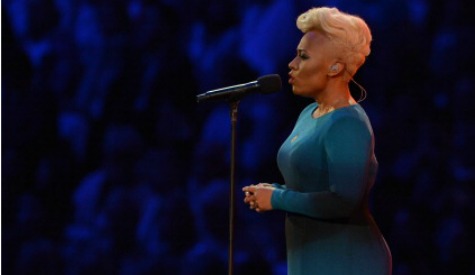 The names, the excited faces, have a cumulative and moving power.
The names, the excited faces, have a cumulative and moving power.
Here the world is, so much of it, and we, Britain, are hosts. 1908, 1948, now.
The turn-out for the United States team was huge – its squad stretched easily down the straight and round the bend.
A statement of intent?
The roar for the British – last, as hosts, but by no means likely to be last in the medals table – was predictably marked.
The team's arrival was marked by a storm of white confetti – mirroring their white outfits with fold trim.
Out they came to the sound of David Bowie's Heroes – just for one night.
Up in the Royal Box, hands clapped along.
Such is the bizarre power of Olympics.
The evening's entertainment had begun peacefully, quietly – bucolically in fact – with pastoral scenes on a British meadow upon which country folk cavorted and real cows, goats and geese blithered about.
Although the cottage in the centre of infield looking , frankly, inflammatory and deserving of the attention of the many fire marshals who have been busying themselves on the Olympic site over the last few weeks.
In a brief appearance before the Ceremony-proper had got underway, the director, Danny Boyle, offered a welcome and a hope that it would not rain – which, but for five minutes, proved founded.
He concluded with a quote from Billy Connolly: "I don't believe in God, but I believe in the people who do" – referencing those who were the keepers of the Olympic spirit.
Not quite sure what he meant by this.
The fervent hope was that the ringing of the Olympic Bell at the end of the countdown minutes after the Ceremony-proper began would not see any repeat of the incident earlier in the day when a handbell rung on camera by the Culture Minister Jeremy Hunt detached itself from its handle and flew just past the head of a nearby young woman.
Hunt's ding-dong moment came as part of the day's Ring The Bells activity – now known as the Great Bells Up.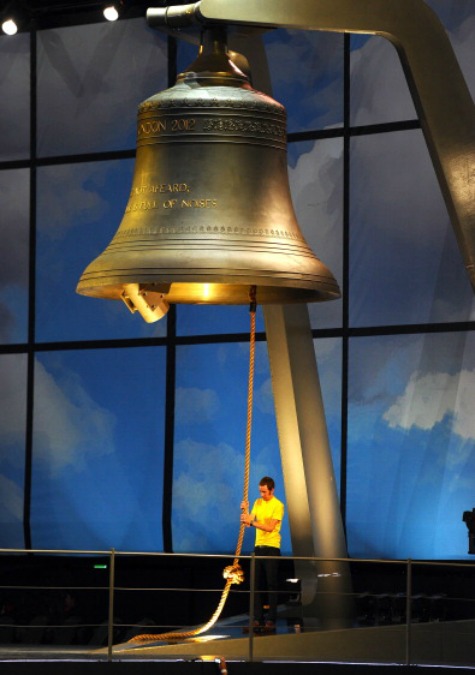 The countdown arrived and was negotiated in orderly fashion, upon which Bradley Wiggins, Britain's first Tour de France winner, arrived in his yellow jersey and approached the biggest bicycle bell he had ever rung and rung it, firmly, once, without referring to raffle tickets or anything else.
The countdown arrived and was negotiated in orderly fashion, upon which Bradley Wiggins, Britain's first Tour de France winner, arrived in his yellow jersey and approached the biggest bicycle bell he had ever rung and rung it, firmly, once, without referring to raffle tickets or anything else.
A choir sang Jerusalem and – smart work on the big display screens – a picture of Jonny Wilkinson wheeling in triumph from that World Cup drop-kick coincided with the words "chariots of fire".
So good that we didn't cut to the ludicrous racing along the sand which has become the quick ID of the film of that name – although we did get a spoof version featuring Rowan Atkinson later, which was also good and in the informal spirit of this event.
As had been rumoured, there was an airing for God Save The Queen – the Sex Pistols' version, that was.
However, the informality of the event did not stretch to playing the line "she ain't no human being"; nor indeed did the excerpt from London Calling by The Clash extend to the bit about "a nuclear error".
The history of our nation was swiftly dealt with as we began with a thunderous depiction of the Industrial Revolution which concluded with an acknowledgement of the great Sigmund Freud – whose groundbreaking work on the human mind began soon after the Revolution had finished – as sex giant smokestack chimneys tumesced their way between banks of green sward.
But, hang on. Wasn't Freud Austrian? (And, of course, I meant six giant smokestack chimneys. Sorry.)
Before long the smokestacks were doing what smokestacks do – it looked a Health and Safety nightmare from where we were sitting two rows in from the action – but then, as we have already established, there were ample fire marshals in attendance.
Soon, however, the fire marshals had something else to worry about: the sight of five Olympic rings of "molten steel" shedding fireworks directly above the head of the bucolic actors on the green fields beneath.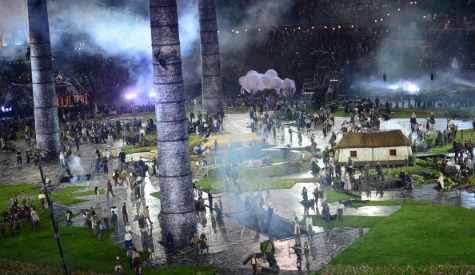 Soon, there was a mighty murmur of surprise as the audience realised that the film showing on the big screen in which Daniel Craig, as James Bond, was ushered into a room in "Buckingham Palace" where a silver-haired "Queen" was seated with her back to him, ignoring him until he cleared his throat, was really showing a room in Buckingham Palace.
Soon, there was a mighty murmur of surprise as the audience realised that the film showing on the big screen in which Daniel Craig, as James Bond, was ushered into a room in "Buckingham Palace" where a silver-haired "Queen" was seated with her back to him, ignoring him until he cleared his throat, was really showing a room in Buckingham Palace.
And, as the turning figure revealed, was really featuring the Queen.
The pair was then shown leaving the Palace en route for a helicopter which then flew over London's landmarks, and under the Olympic Rings suspended beneath Tower Bridge, before reaching the stadium, where they parachuted out.
It soon became clear, however, that spectators had been cruelly duped, as the real Queen arrived in the stand accompanied by the Duke of Edinburgh and the IOC President Jacques Rogge – all very disappointing.
By way of welcome, a choir of children very nicely sang the National Anthem – and more than one verse of it too.
No plastic Brits on show tonight, thank you.
The centrefield then filled with nurses pushing beds – thankfully, despite the late disappearance of the stunt biking and other elements from the Ceremony because of worries about people being able to get transport home, the National Health had avoided further cuts.
Irresistible – spotting the groups and the acts as the Ceremony celebrated British popular music.
Oh yes, we are really good at this. The Who. The Beatles. The Clash. The Jam. The Sex Pistols. The Prodigy. Blur. Dizzee Rascal. Just imagine if Paris had won the bid – it would have been 20 minutes of Johnny Hallyday (is that terribly unkind?).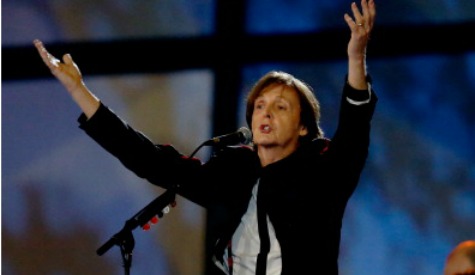 Next, we were invited to join Tim Berners-Lee, inventor of the World Wide Web, as his words "This is for everyone" appeared writ large on the audience.
Next, we were invited to join Tim Berners-Lee, inventor of the World Wide Web, as his words "This is for everyone" appeared writ large on the audience.
In his welcoming address, the London 2012 chairman Sebastian Coe said: "I have never been so proud to be British and to be a part of the Olympic Movement as I am on this day at this moment.
In every Olympic sport there is all that makes life worth living.
"Humans stretched to the limit of their capabilities, inspired by what they can achieve, driven by their talent to work harder than they can believe possible, living for the moment but making an indelible mark on history."
Fine words to conclude a fine and proud occasion
By Mike Rowbottom
Source:www.insidethegames.biz
GAMES
Mayor Boris gets his wish: London "knocks their socks off" with magical Olympic Opening Ceremony
 The London 2012 Olympics got off to the best possible start on the banks of the Thames last night, as artistic director Danny Boyle's breathtaking 100-minute Opening Ceremony captivated an 80,000 crowd packed with celebrities and VIPs.
The London 2012 Olympics got off to the best possible start on the banks of the Thames last night, as artistic director Danny Boyle's breathtaking 100-minute Opening Ceremony captivated an 80,000 crowd packed with celebrities and VIPs.
From the moment yellow-jerseyed Tour de France winner Bradley Wiggins opened proceedings at 9pm GMT with a single chime of the 23-tonne Olympic bell, the audience was subjected to a joyous assault on the senses that catapulted them through 200 years of British history from the industrial to the digital revolution, the latter embodied by the presence of Sir Tim Berners-Lee, inventor of the world wide web.
The answer to the night's great secret, the identity of the lighter of the Olympic cauldron in the centre of the stadium, was not revealed until well after midnight – and virtually none of the speculation that had accompanied the build-up to the Games was right.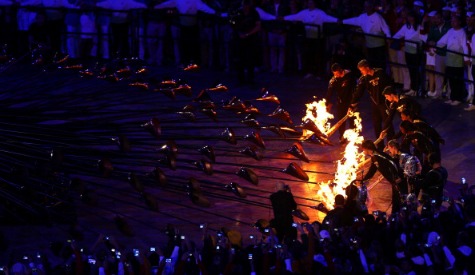 The honour was bestowed on seven young athletes said to represent the host nation's hopes for the next Olympics and beyond, in keeping with the emphasis on youth maintained by the London project since it won the right to host the 2012 Games in Singapore seven years ago.
The honour was bestowed on seven young athletes said to represent the host nation's hopes for the next Olympics and beyond, in keeping with the emphasis on youth maintained by the London project since it won the right to host the 2012 Games in Singapore seven years ago.
The most daring of many spectacular coups de theatres that preceded this came when the Queen appeared – repeat, appeared – to parachute into the stadium from a helicopter, accompanied by James Bond actor Daniel Craig.
But, from Ken Loach to Harry Potter, there was scarcely a cultural reference-point that wasn't touched upon in a show that also included a snatch of the Sex Pistols' version of God Save the Queen, a song once famously banned by Olympic broadcaster the BBC, and a Mini or two, much to the delight, no doubt, of London 2012 sponsor BMW.
Other highpoints included the climax of the industrial revolution segment, with the Olympic rings, in red hot steel suspended over the stadium bathed in blue light; a cameo by Rowan Atkinson, the comedian behind Mr Bean, as the white-mopped Sir Simon Rattle conducted music from the Olympics film Chariots of Fire; and an extended passage celebrating the National Health Service (NHS), featuring hundreds of children and NHS beds and employees.
If it could not quite match the sheer jaw-dropping awe of Beijing's Opening Ceremony of four years ago, Boyle's £27 million ($42 million/€34 million) creation was infused with a warmth and humanity notably lacking from that no-expense-spared paean to China's emergence as a global power.
If that 2008 show was, at heart, a celebration of uniformity, this was a crowded, phantasmagorical hymn to diversity.
After a long interlude while the 205 athlete delegations filed colourfully in, culminating with Britain, led by Flagbearer Sir Chris Hoy, the Arctic Monkeys heralded the most formal part of proceedings.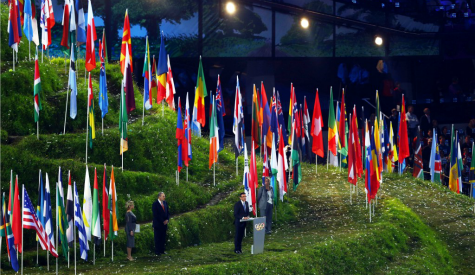 First, from an artificial green hill, now bedecked with flags, to one end of the stadium, we were all welcomed by London 2012 chairman Sebastian Coe.
First, from an artificial green hill, now bedecked with flags, to one end of the stadium, we were all welcomed by London 2012 chairman Sebastian Coe.
"In the next two weeks, we will show all that has made London one of the greatest cities in the world," Coe promised.
"This is our time"
In a short address, dwelling on London's unique role in Olympic history as the host of three Summer Games spanning more than a century, International Olympic Committee (IOC) President Jacques Rogge proclaimed: "The Olympic Games are coming home tonight."
Rogge also emphasised that for the first time in Olympic history all participating teams would have female members, in a development he described as "a major boost for gender equality".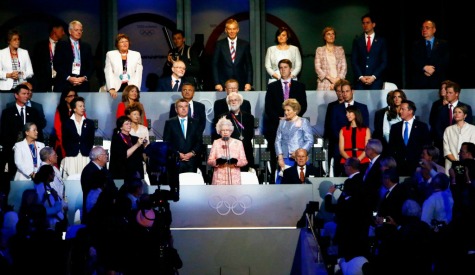 Fittingly it was left to a woman, Her Majesty the Queen, seemingly none the worse for her parachute glide, to declare the Games open.
Fittingly it was left to a woman, Her Majesty the Queen, seemingly none the worse for her parachute glide, to declare the Games open.
And then it was on to the raising of the Olympic flag in the presence of a frail Muhammad Ali and the night's concluding moment: the symbolic lighting of the Olympic cauldron by the seven young Torchbearers.
The day had started with the Queen's rowbarge Gloriana carrying the Olympic Flame down the Thames, trailed by a flotilla, as it neared the end of its 70-day, 8,000-mile journey around Britain.
At 8.12am, bells rang out across Britain for three minutes.
British Prime Minister David Cameron declared the country "ready to welcome the greatest show on earth".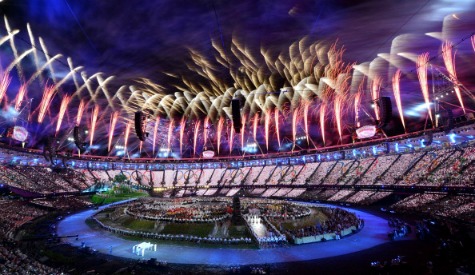 And what do you know? He was right.
And what do you know? He was right.
If I may end with one mildly discordant note, it was that we nearly ended up relating these great events under a length of plastic sheeting – the organisers' disconcertingly primitive means of combating the threat of possible rain.
As it turned out, we stayed dry, by the skin of our teeth.
But in an isle which, as we all know, is full of weather as well as noises, this was just not good enough.
By David Owen at the Olympic Stadium in London
Source: www.insidethegames.biz
Voisin delighted for Burns
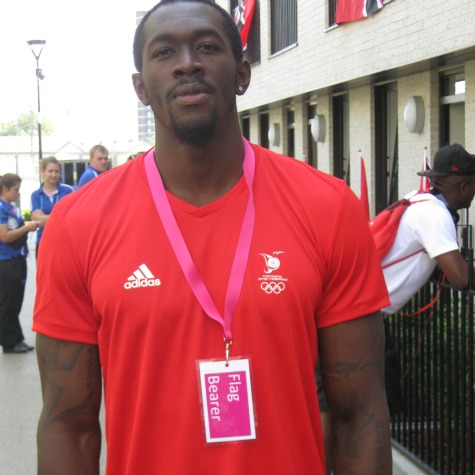 DEXTER VOISIN, manager of the Trinidad and Tobago track and field team at the London Olympics, is pleased that the Trinidad and Tobago Olympic Committee (TTOC) chose sprinter Marc Burns to carry the flag at today’s opening ceremony.
DEXTER VOISIN, manager of the Trinidad and Tobago track and field team at the London Olympics, is pleased that the Trinidad and Tobago Olympic Committee (TTOC) chose sprinter Marc Burns to carry the flag at today’s opening ceremony.
“I think it’s an honour for him and also for track and field to carry the flag in the opening ceremony,” said Voisin yesterday, in an interview from London, England. “I think it is his fourth Olympics.
“He’s what you’ll call a veteran, an experienced athlete in these circumstances. The TTOC made the decision and I think it was a very good decision.”
Asked which athletes are not in the Village at the moment, he said, “we still have Renny Quow to come to the Games Village. “Richard Thompson went back to Norway to return on the 30th. He went back to final training with his coach.”
With regards to the atmosphere in London, Voisin noted, “we arrived in the Games Village (on Wednesday) (and) the whole atmosphere (yesterday) has been overwhelming.
“You have all the athletes now gathering,” he continued. “We went training (yesterday) afternoon and everybody is looking to rest now.”
Asked if there were any problems in the Village, Voisin replied, “everything’s smooth so far.”
The opening ceremony will take place today but Voisin commented, “we don’t start the competition until the third (of August) so there’s no hype in terms of the opening ceremony.
www.newsday.co.tt
Burns elated to carry T&T flag
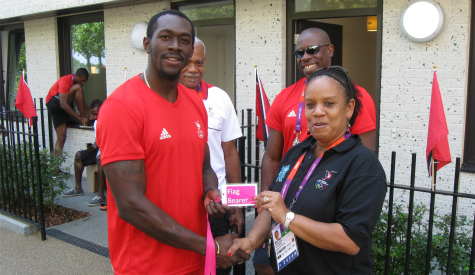 "It's a great honour and privilege to carry out such a duty for Trinidad and Tobago."
"It's a great honour and privilege to carry out such a duty for Trinidad and Tobago."
Marc Burns was elated on hearing of his selection as T&T's flagbearer for today's Olympic Games opening ceremony, at the Olympic Stadium here in London, England.
The veteran sprinter captured his first Olympic medal at the 2008 Games, in Beijing, China, teaming up with Keston Bledman, Emmanuel Callender and Richard Thompson for silver in the men's 4x100 metres relay.
Burns is competing at his fourth Olympic Games. He made his debut as a 17-year-old, at the 2000 Games in Sydney, Australia, competing in the sprint relay. Four years later, in Athens, Greece, Burns was disqualified for a false start in the opening round of the 100m dash, but helped T&T cop seventh spot in the 4x100m final. And in Beijing, he earned relay silver and also reached the 100m final, finishing seventh in the championship race.
Burns is the Mr Consistent of T&T sprinting. He reached the century final at the 2005, 2007 and 2009 editions of the World Championships. The 29-year-old athlete also has three World Championship sprint relay silver medals—2001, 2005 and 2009.
"Having faith in God, focusing on what I can control, and having faith in my team—coach, physio, family and the close circle of people around me. That's the main thing for longevity.
"My biggest moment," he continued, "was the World Championships in 2001, given my age and it was my only major medal at the time."
Eighteen-year-old Burns teamed up with Ato Boldon, Jacey Harper and 16-year-old Darrel Brown for 4x100m bronze. The T&T quartet was later promoted to silver following the disqualification of the United States. US anchorman Tim Montgomery was banned for doping.
Burns was selected as the T&T reserve for the men's 100m here in London, after finishing fourth at the National Open Track and Field Championships. He is also a member of the 4x100m squad.
"My main focus was to come to the Games and make the athletes comfortable--enlighten them on what is expected. I'm more mature now and I see things through a whole different perspective. I understand fully what is expected at the Games. It's not just about competing, but showing a certain code of conduct for those who are following behind."
Burns recently clocked 10.00 seconds to finish third at the International Athletics Meeting, in Lucerne, Switzerland. Rondel Sorrillo was seventh in 10.23.
At the National Championships, Sorrillo copped third spot in the 100m, and was selected to compete in the event here in London, along with Bledman, winner of the national title in a personal best 9.86 seconds, and Thompson, the 2008 Olympic 100m silver medallist.
Sorrillo, the national champion in the 200m, was also chosen to compete in the half-lap event at the London Games.
Team officials have until next Wednesday to decide which three sprinters will fly the Red, White and Black in the 100m.
"I'm here to represent T&T, regardless," Burns told the Express. "So if I do not run the 100, all my energy and focus will be on the relay. The 10-flat came at the right time, going into the Games. Even if I don't run the 100, I'm capable of an exceptional second leg in the relay."
Burns is playing a key leadership role in the 4x100m.
"I'm enlightening the team on what's expected, and the frame of mind to go about doing that. It's not about the other teams and getting caught up in the hype--focus on what we need to do and going out and doing it.
"Anything could happen. We're not short-changing ourselves. Just like everybody else, we're going for the gold medal. If God sees it another way and another colour medal, we would be grateful."
Two days after his 10-flat run in Lucerne, Burns' running gear was stolen as he prepared to compete at the Folksam Grand Prix, in Sweden. Though he ran in a borrowed pair of spikes that did not fit, Burns still managed to win, the T&T track star clocking 10.50 seconds, into a 1.9 metres per second headwind.
The resilient Burns said a fifth Olympic appearance, at the 2016 Rio Games, is a possibility.
"I will only be 33 at the next Olympics, so once I'm healthy and all is well, that could be on my resume also. I'll take it one step at a time."
T&T chef de mission Annette Knott told the Express she will always remember a statement Burns made at the 2007 Pan American Games, in Rio de Janeiro, Brazil.
"Marc said even if we had a three-man relay and he had to run two legs, he will run for Trinidad and Tobago.
"For his silver medal in 2008, his commitment as an athlete and his consistent representation, Marc will carry the flag. This is his fourth Olympics, and he is in fact the most senior athlete.
"He's always there, in so many finals. It's about sustainability and consistency. Marc is one of the more consistent athletes we've had, and not for one minute is he looking for the glory."
In a T&T Olympic Committee (TTOC) press release, president Larry Romany paid tribute to Burns.
"I was chef de mission at the Sydney Olympics when the then 17-year-old Marc made his Olympic debut. Over the years it has been a privilege to work with Marc. He is a class act who has never failed to answer the call be it CAC, Pan Am, Commonwealth or Olympic Games."
Today's opening ceremony starts at four p.m. (T&T time). The outfits to be worn by Burns and the rest of the team during the parade of nations are the creations of T&T designers Richard Hope and Nivanya Abraham.
-Kwame Laurence in London
www.trinidadexpress.com
Trini lives Olympic dream
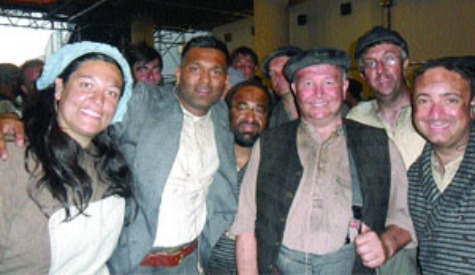 When the ceremony that officially signals the opening of the 2012 London Summer Olympic Games gets underway today, there will be one Trinidadian among the thousands of athletes, perfor- mers and spectators who will be living his own Olympic dream.
When the ceremony that officially signals the opening of the 2012 London Summer Olympic Games gets underway today, there will be one Trinidadian among the thousands of athletes, perfor- mers and spectators who will be living his own Olympic dream.
Born in Ghandi Village, Debe, Jimmy Badal is one of the 10,000 performers who will bring to life director Danny Boyle's £27 million production, "Mass Movement", to billions of viewers worldwide.
Badal, who currently lives in England, says it's a dream come true.
"After viewing the Barcelona Games in 1992 as a little boy, I said to myself: one day, I would represent my country at the Olympics, so when they advertised for volunteers for London's opening ceremony, I jumped at the opportunity.
I was interviewed two years ago, and after lots of tough auditions, I was successful in gaining a role for the opening performance."
Badal said being accepted as a volunteer was the easy part.
What followed was six months of a difficult journey to be ready for the opening ceremony.
"I have had to devote hundreds of hours to training and rehearsals since it started last year and had to work with volunteers from over 75 countries, as well as training managers from all around the globe.
"Initially, we began training at Dagenham in East London, which is quite a distance from the Olympic Park. In the weeks and months that followed, we began working with the cast, props, teams and five thousand volunteers, moving at the same time.
"It was here we got all our instruction from creative director Danny Boyle, and it was here that the picture started to come together in our minds," he told the Express.
Badal credits his mother and his love for sports for his willingness to do volunteer work at any level.
"My mum has been a huge inspiration in my life. She taught me how important it is to always give back to the village, the community and the less fortunate. She is a strong woman, and I learned most of my values from her.
"Additionally, having a passion for sports led to me serving as a volunteer when Trinidad hosted the FIFA Under-17 World Cup in 2001. I gained a lot of experience, he said."
Badal could not share much about his role since they were sworn to secrecy, however, he will feature in the opening segment, which is a drama- tic tale of the Industrial Revolution's working men and women.
His section highlights the transformation from agriculture to industry in England and features 70 sheep, 12 horses, ten chickens, three cows, two goats, dogs and geese.
Additionally, traditional countryside cottages will stand together with a mining wheel, harking back to the country's proud industrial heritage, all drenched in faked pouring rain to reflect Britain's typical weather.
The show, called the "Isle of Wonder", is inspired by Shakespeare's The Tempest and will entail one thousand drummers, video clips of the Duke and Duchess of Cambridge, with the sound of Queen's "Bohemian Rhapsody" resonating in the background.
"My dedication and perseverance of attending the final rehearsals will pay off (today) when I perform for Her Majesty Queen Elizabeth II, more than one hundred heads of state, one hundred and fifty IOC members and billions of viewers around the world.
"At this time in my life, I am truly proud to be a Trinidadian and to be representing my country as a volunteer at the opening ceremony of the Olympic Games," he said.
"Who would have thought that a man from Debe in Trinidad would be performing to the biggest global audience in recent years? But twenty years after the Barcelona Olympics' opening ceremony, my dream finally comes true."
—Editor's Note: Danny Boyle is noted for directing the movie Slumdog Millionaire.
-Donstan Bonn
Source: www.trinidadexpress.com
Can ‘Torpedo’ turn screws on Bolt?
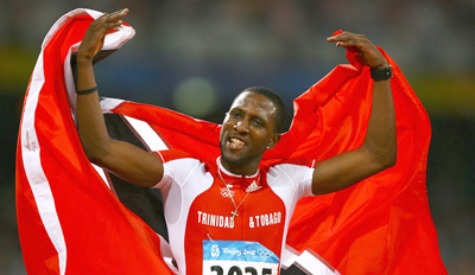 Richard “Torpedo” Thompson started his sprinting career at Louisiana State University (LSU) while on a scholarship. As a member of the LSU Tigers track and field team, he lowered the NCAA Indoor record in the 60 metres in 2008. In his first World Championships in Athletics, in Osaka in 2007, Thompson failed to make it past the quarterfinals, placing eighth in 10.44 seconds. The following year, Thompson achieved his best moment up to then by taking both the 60m indoor and outdoor sprints at the NCAA Championships. He expanded his portfolio to include the 200m that year and ran his personal best (pb) for the 200m of 20.18s. His 60m pb is 6.51s achieved in Fayetteville, Arkansas, USA. At the 2008 Beijing Olympics, “Torpedo” sped to a pb time of 9.89 s in the men’s 100m, to finish second behind World record holder, Usain Bolt, who set the Olympic record of 9.69. His new pb time made him the second fastest T&T 100m sprinter ever, after four-time Olympic medallist Ato Boldon. Thompson grabbed his second silver medal in Beijing when teaming up with Keston Bledman, Marc Burns, Emmanuel Callender for the men’s 4x100m relay final. The local team finished in 38.06 behind Jamaica (37.10). With the substitution of sprinter Aaron Armstrong for Callender, that team also grabbed gold at the 2008 Central American and Caribbean (CAC) Championships in a time of 38.54.
Richard “Torpedo” Thompson started his sprinting career at Louisiana State University (LSU) while on a scholarship. As a member of the LSU Tigers track and field team, he lowered the NCAA Indoor record in the 60 metres in 2008. In his first World Championships in Athletics, in Osaka in 2007, Thompson failed to make it past the quarterfinals, placing eighth in 10.44 seconds. The following year, Thompson achieved his best moment up to then by taking both the 60m indoor and outdoor sprints at the NCAA Championships. He expanded his portfolio to include the 200m that year and ran his personal best (pb) for the 200m of 20.18s. His 60m pb is 6.51s achieved in Fayetteville, Arkansas, USA. At the 2008 Beijing Olympics, “Torpedo” sped to a pb time of 9.89 s in the men’s 100m, to finish second behind World record holder, Usain Bolt, who set the Olympic record of 9.69. His new pb time made him the second fastest T&T 100m sprinter ever, after four-time Olympic medallist Ato Boldon. Thompson grabbed his second silver medal in Beijing when teaming up with Keston Bledman, Marc Burns, Emmanuel Callender for the men’s 4x100m relay final. The local team finished in 38.06 behind Jamaica (37.10). With the substitution of sprinter Aaron Armstrong for Callender, that team also grabbed gold at the 2008 Central American and Caribbean (CAC) Championships in a time of 38.54.
In 2009, Thompson was involved in a car accident on New Year’s Day, resulting in minor injuries which caused him to miss the indoor season. Defying the odds, he competed at the 12th IAAF World Track and Field Championships in Berlin, Germany, later in August. He reached the 100m final, finishing fifth, with a season’s best of 9.93 seconds. Thompson then joined forces with Darrel Brown, Burns and Callender in the final to finish second behind Jamaica in 37.62s to set the national record. In 2010 Thompson was crowned double champion at the NAAA/Sagicor National Track and Field Championships, taking the 100m (10.01) and 200m (20.37). His 2010 season was further highlighted at the IAAF Diamond League circuit, when he won the 100m at the Prefontaine Classic with a wind-assisted time of 9.89s. In 2011, Thompson broke into T&T’s history books when he ran 9.85s in the 100m final at the National Championships, erasing the previous 9.86 record set by Ato Boldon. The achievement ranked Richard as the ninth fastest on the all-time list. Thompson has struggled this year. His three-year reign as national 100m champ was halted by Keston Bledman who blazed to the finish line in 9.86. Thompson had to settle for second with a time 9.96s—his first and only 100m sub-ten clocking for the year.
Thompson will be looking to prove that he still has what it takes to mount the podium in the men’s 100m at the London Games.
More Info
NAME: RICHARD THOMPSON
DOB: June 7, 1985 (Age 27)
Height: 6' 2" (188 cm)
Weight: 176 lbs (80 kg)
Affiliations: Louisiana State University, USA / HSI, USA
Olympic event(s): 100m, 200m, 4x100m relay
Major Achievements: Olympic Silver Medals (100 and 4 x 100 metres Olympics 2008)
Performance dates in London
100 metres August 4
200 metres August 7-9
